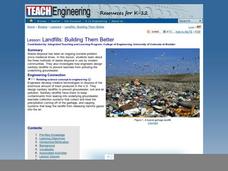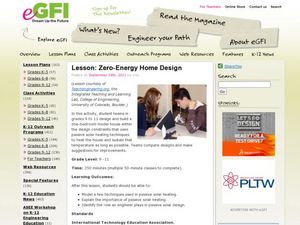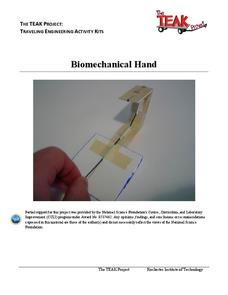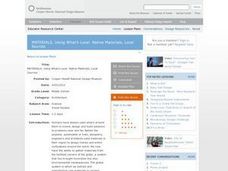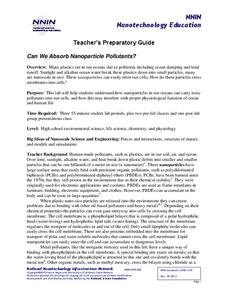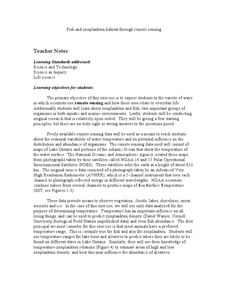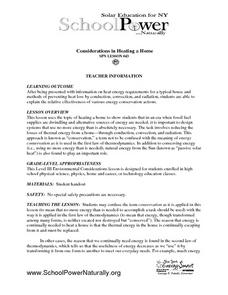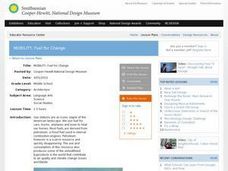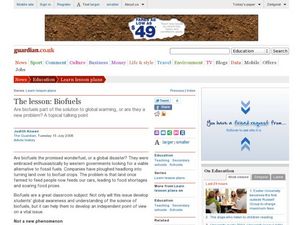Curated OER
Green Genes: Genetically Modified Organisms in Our Food
Students investigate how and why genetically modified organisms are used as food crops. They identify the advantages and disadvantages of these crops through internet research then present their views and discuss them as a large group.
Curated OER
Landfills: Building Them Better
Students investigate the three methods of waste disposal. They listen to a teacher-led lecture, answer discussion questions, and write a letter to the E.P.A. from the viewpoint of an environmental engineer.
Curated OER
Encouraging Girls in Engineering
Use these lesson plans rich in teamwork, societal impact, and creativity to get girls excited about engineering!
Curated OER
The Air We Breathe
Students discover the cuases of pollution. They investigate different pollutants that exist. Stsudents research technologies developed by engineers to reduce the amounts of air pollution. Upon completion of assigned activities,...
eGFI
Lesson: Zero-Energy Home Design
Challenge young engineers to design a one-bedroom scale house to collect and maintain as much heat as possible. Particular constraints must be adhered to, but creativity is also allowed. Included is a diagram and background information...
Curated OER
Are Dams Forever?
Students consider the life span of dams, and what would happen if a dam falls apart. In this environmental impact instructional activity, students discuss what the purposes of dams are, how they could be damaged.
Teach Engineering
Photosynthesis—Life's Primary Energy Source
Wouldn't it be great if you could produce your own food? Scholars learn about the processes of photosynthesis and cellular respiration in plants. They consider how to use photosynthesis as a model of an efficient system and how to apply...
Rochester Institute of Technology
Biomechanical Hand
In 1993, five biomedical engineers in Edinburgh, Scotland, created the first functional bionic arm. In the activity, learners explore the world of bioengineering through discussion and hands-on exploration. In groups, participants...
Teach Engineering
Clean it Up!
Harness the power of bacteria. Scholars see how using organisms that exist in nature can help solve human problems in the process known as bioremediation. They research and discuss several successful examples, such as using oil-eating...
Society of Petroleum Engineers
Renewable and Nonrenewable Energy
Energize an environmental science unit on natural resources with this collection of instructional materials. From simple coloring sheets for primary grade children, to guiding questions for a high school research report, a wide variety...
Kenan Fellows
Sustainability: Learning for a Lifetime – The Importance of Water
Water is essential for life—and understanding the importance of clean drinking water is essential in understanding sustainability! Show your environmental science class the basics of water testing and treatment through a week-long...
Curated OER
MATERIALS, Using What’s Local: Native Materials, Local Sources
Students consider the development of different societies. In this environmental building lesson, students consider local resources and how societies choose to use them. Students use their findings to design a 'green' building for use in...
Curated OER
Mission Possible: Energy Trade-offs
Teams of electrical engineers work together to develop plans for increasing electricity to a fictitious, but growing community. They consider different sources of electricity, both renewable and nonrenewable, the cost of building and...
National Energy Education Development Project
Exploring Hydropower
In 2006, about 20 percent of the world's electricity was generated from hydroelectric power. In the presentation, scholars review the water cycle and gravitational energy to begin to understand how humans harness the power of water. They...
National Nanotechnology Infrastructure Network
Can We Absorb Nanoparticle Pollutants?
Just because we can't see it doesn't mean it isn't there! A growing concern for environmental scientists is toxic nanoparticles in our air and water. Young scholars conduct an experiment to demonstrate how these particles can cross our...
Curated OER
Fish and Zooplankton Through Remote Sensing
Ecology aces examine sea surface temperature maps and relate temperatures to concentration in fish and zooplankton populations. Take your class to a computer lab and provide experience with actual remote sensing data. Some of the links...
Curated OER
Considerations in Heating a Home
Emerging engineers discover how important it is to conserve energy as fossil fuel supplies are being diminished. This is accomplished by working through a handout that explains energy requirements for heating a home during the winter....
California Academy of Science
Climate Change Impacts
Getting kids thinking about climate change now, will hopefully push them into action when they become adults. Young environmentalists discuss the evidence and causes of climate change seen in the state of California. They brainstorm ways...
Curated OER
How Clean is that Water?
Middle schoolers conduct a water quality experiment on a local stream using benthic organisms as a water quality indicator. Based on the results from the experiment, students determine how engineers use this background information to...
Curated OER
Mobility: Fuel for Change
Students determine how to lower the reliance on petroleum-based fuel. In this environmental stewardship instructional activity, students create concept cars for the future that using renewable energy.
Curated OER
The Lesson: Bio-fuels
Students explore the pros and cons of bio-fuel use. In this environmental stewardship lesson, students visit selected websites to discover what bio-fuels are and the effect they may have on the environment.
Curated OER
There is Room for All
Students create a poster about the three main uses of forest lands. In this forest lesson plan, students focus on its economic use, environmental use, and recreation use.
Curated OER
Creating the Model
Young scholars comprehend what has been explored in the previous earthquake engineering design lessons, by putting their designs to the test.
They are given pairs a piece of paper, and an empty plastic bottle or can. Students stand the...
Curated OER
Peanut Butter Broccoli
Fifth graders explore food production by viewing DNA presentations. In this genetic engineering lesson, 5th graders discuss the foods they typically eat at home and how many common foods are engineered in a way that can produce a bigger...



